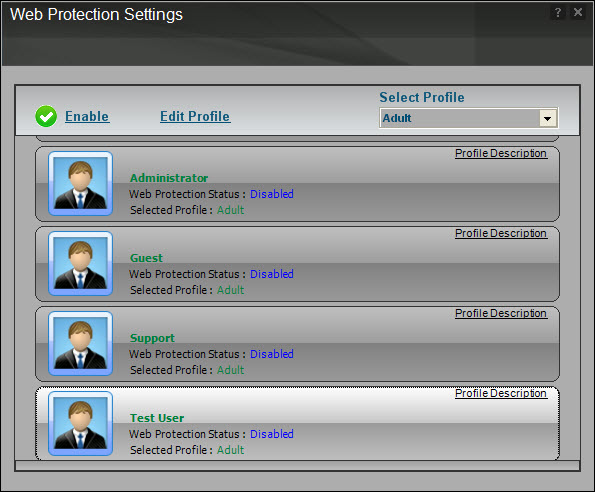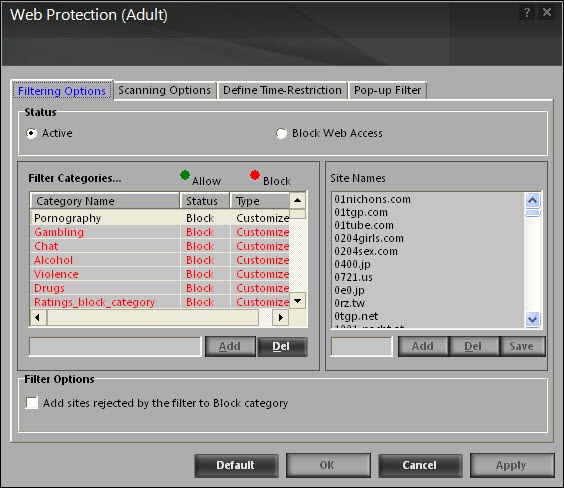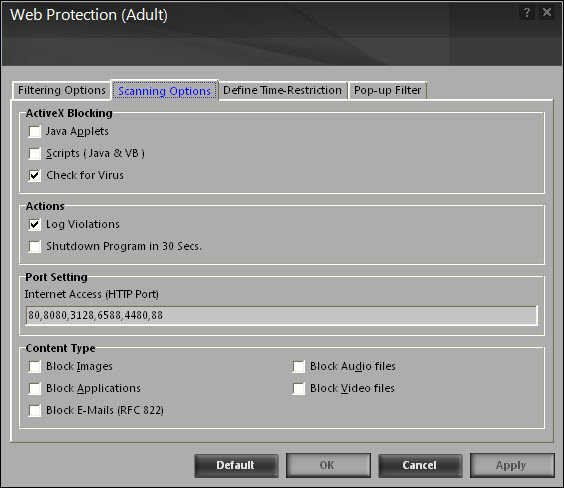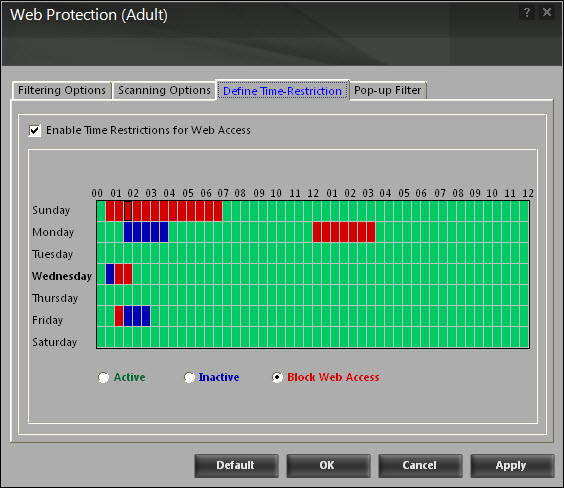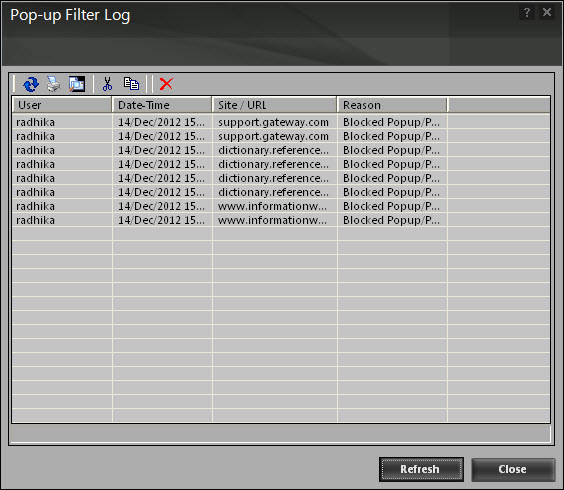From eScan Wiki
| Revision as of 05:56, 20 October 2014 Webmktg (Talk | contribs) (→'''Description''') ← Previous diff |
Revision as of 05:58, 20 October 2014 Webmktg (Talk | contribs) (→'''Description''') Next diff → |
||
| Line 18: | Line 18: | ||
| | | ||
| - | [[Image:abc.JPG|Left]] | + | [[Image:abc.JPG|center]] |
| | | ||
Revision as of 05:58, 20 October 2014
eScan Version 14 Online Help
Web Protection
This section provides the description of eScan's Web Protection and the various settings available in this feature.
Contents |
Description
Web Protection is the fourth module of the eScan for ISS. This module uses highly advanced algorithms based on the occurrence of specific words or phrases in the contents of web site and to block Web sites containing pornographic or offensive material. This feature is extremely beneficial to parents because it prevents kids from accessing Web sites containing harmful or restricted content. Administrators can also use this feature to prevent employees from accessing non-work-related web sites during work hours.
This page provides you with options required to configure the module. You can configure the settings from the following 2 sections:
Configuration
This section displays the following information.
- Web Protection Status : It displays the status of whether Web Protection module is started or stopped.
- Selected User Profile : It displays the selected user profile with its status.
- Web Phishing Filter Status : It displays the status of Web phishing filter.
Start/Stop:
Click an appropriate option to enable or disable Web-Protection module.
- Note: If you want to apply the web protection settings to the selected user profile, You have to make sure that web protection status is enabled on both the windows – on the eScan main window, under Configuration section, Start/Stop option and on the Web Protection Settings window, enable/Disable button on upper-left corner of the window.
Start/Stop Phishing Filter:
Click this button to start and stop the phishing filter.
Settings:
When you click this button, the Web Protection Settings window appears. On the Web Protection Settings window, you have four different profiles – Walled Garden, Teenager, Adolescent, and Adult. You can change the web protection status of the selected user profile and you can edit the settings of the selected profile.
- Note: On below the screen of all the tabs contains four buttons — Default, OK, Cancel, and Apply, which you have to use after configuring the settings based on your requirement.
- - Default: Click this button to apply the default settings.
- - OK: Click this button after you click the Apply button to apply the configured settings.
- - Cancel: Click this button to cancel the configured settings or to close the window.
- - Apply: Click this button to apply the configured settings.
- Note: On below the screen of all the tabs contains four buttons — Default, OK, Cancel, and Apply, which you have to use after configuring the settings based on your requirement.
Perform the following steps to edit the settings of a profile:
- Click the Settings button.
- Select an appropriate profile for which you want to change the settings from the Select Profile drop-down list, and if you want to change the web protection status of a profile, click Enable/Disable button on upper-left corner of the window, and then click the Edit Profile button. The Web Protection (Adult) window appears.
- Click the Filtering Options tab.
- Filtering Options
- Scanning Options
- Define Real-Time Restriction
- Pop-up Filter
The Web Protection Settings window appears.
The Web Protection (Adult) window appears.
This section provides you with options for filtering the websites based on various categories. You can either allow or block websites depending on certain words/phrases that are found in the web sites.
- Status: This section helps you to allow or block access to specific Web site based on Filter Categories. You can set the status as Active or Block Web Access. Select the Block Web Access option, if you want to block all the web sites except the ones that have been listed in the Filter Categories. When you select this option, only Filtering Optionsand Pop-up Filter tabs are available.
--> Filter Categories: This section uses the following color codes for allowed and blocked Web sites.
>> Green: It represents an allowed Web site.
>> Red: It represents a blocked Web site.
The filter categories used in this section include Pornography, Gambling, Chat, Alcohol, Violence, Drugs, Ratings_block_category, Websites_Allowed, and so on. You can also add or delete filter categories depending on your requirement.
--> Category: [Category name]: This section shows the Words / Phrases list, which lists the words or phrases present in the selected category. In addition, the section displays the Site Names list, which lists the Web sites belonging to the selected category. You can also add or delete filter categories depending on your requirement.
--> Filter Options: This section includes the Add sites rejected by the filter to Block category check box. Select this check box if you want eScan to add Web sites that are denied access to the Block category database automatically.
This tab helps to block images, ActiveX controls, media components, and applications from appearing within the browser.
- ActiveX Blocking: An ActiveX control is a component program that can be automatically downloaded and executed by a Web browser. It is similar to a Java applet. ActiveX controls may include malicious code and therefore may pose as a security hazard.
--> Java Applets: Java Applets are programs that are written in the Java programming language. These applets can be embedded in an HTML page and can be viewed from a Java-enabled Web browser. Applets enhance the interactivity in Web pages and provide users with an enhanced Web experience. However, some applets contain malicious code that may either disrupt the processes running on your computer or steal sensitive information. Select this check box to block applets from being downloaded to your computer.
--> Scripts (Java & VB): Scripts are usually written in scripting languages such as JavaScript and VBScript. A script is a list of commands that can execute without user input. With the help of scripts, you can automate certain tasks within an application to work in a particular computing scenario. Hackers often use malicious script to steal information about the victims. When you select the Scripts (Java & VB) check box, eScan blocks scripts from being downloaded to your computer from the Internet.
--> Check for Virus: [Default] This check box is selected by default. Select this check box if you want eScan to scan and block all Web sites that contain malicious code.
- Actions: This section helps you select the actions that eScan should perform when it detects a security violation.
--> Log Violations: [Default] This check box is selected by default. Select this check box if you want Web Protection to log all security violations for your future reference.
--> Shutdown Program in 30 Secs: Select this check box if you want Web Protection to shut down the browser automatically in 30 seconds when any of the defined rules or policies is violated.
- Port Setting: This section helps you specify the port numbers that eScan should monitor for suspicious traffic.
--> Internet Access (HTTP Port): Web browsers commonly use the port numbers 80, 8080, 3128, 6588, 4480, and 88 for accessing the Internet. You can add port numbers to the Internet Access (HTTP Port) box to monitor the traffic on those ports.
- Content Type: This section helps you block content based on their type, such as images, applications, e-mails (RFC822), audio files, and video files.
This section helps you define policies to restrict access to the Internet.
- Enable Time Restrictions for Web Access: Select this check box if you want to set restrictions on when a user can access the internet. By default, all the fields appear dimmed. The fields are available only when you select this check box. You also have an option to select and schedule the days in a week, and time on which you want to allow or restrict the web access.
--> Active: Click this option if you want to keep web protection active on certain days at specific time.
--> Inactive: Click this option if you want to keep web access inactive on certain days at specific time.
--> Block Web Access: Click this option if you want to block web access on certain days at specific time.
This section includes options for customizing notification alerts, whitelist, and violation logs for pop-ups.
Notification: In this section, you can configure the settings for receiving notification alerts. Select the Block Pop – up check box, if you do not want to block certain websites listed in white list and select the Beep Via PC Speaker check box, if you want to receive a beep sound, whenever a pop-up window is blocked.
White List: This section helps you customize the list of Web sites whose pop-ups will not be blocked by the Pop-up Filter.
Violation Logs: You can also log all violations by selecting Log Violations check box, add the web sites to the whitelist for which a pop-up was blocked by the pop-up filter, clear the log, browse the web sites listed in the log, and refresh the log. In addition, you can assign a key to allow pop-ups temporarily for the Web site being accessed.
Reports
This section displays the following information.
- Total Sites Scanned: It shows the total number of Web sites scanned by Web Protection.
- Total Sites Blocked: It shows the total number of Web sites blocked by Web Protection.
- Last Site Scanned: It shows the name of the last Web site scanned by Web Protection.
In addition, you can view the following reports.
View Web Protection Log:
This button opens the Web Protection Violations Log window, which displays information such as the user name, date and time when the violation occurred, the URL of the Web site, the reason for the violation, and the word or phrase that triggered the violation event.
View Pop-up Filter Log:
This button opens the Web Protection View Popup Filter Log window, which displays the details of the pop-up windows generated by Web sites that you visited. This window displays information such as the user name, date and time when the pop-up window was displayed, the URL of the Web site.
View Report:
This button displays the Report for Web Protection window. This window displays the report for the Web Protection module for a given range of dates in a tabular format when you click the Generate Report button.

